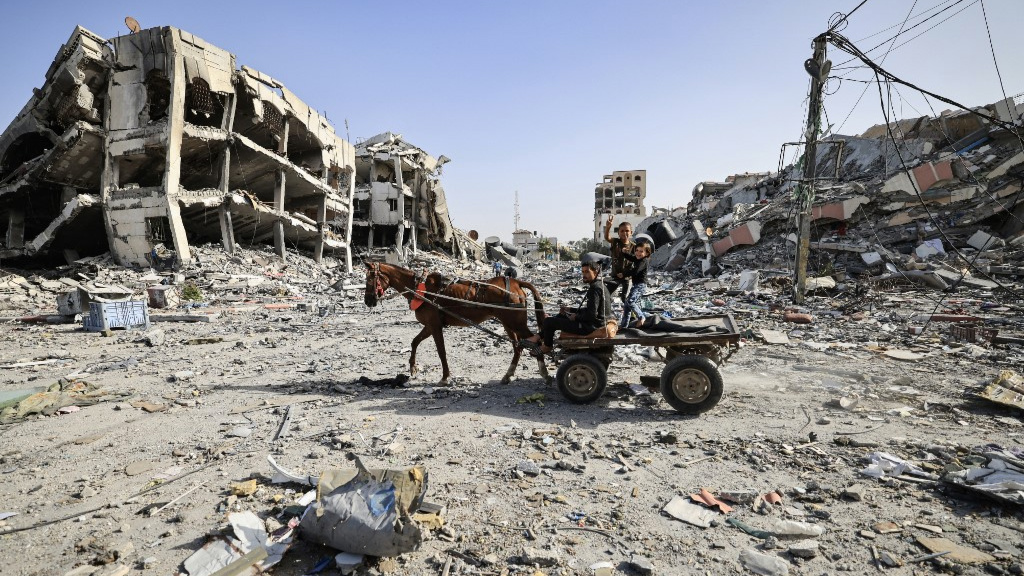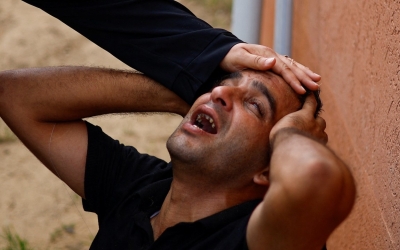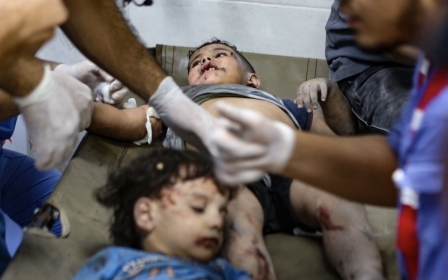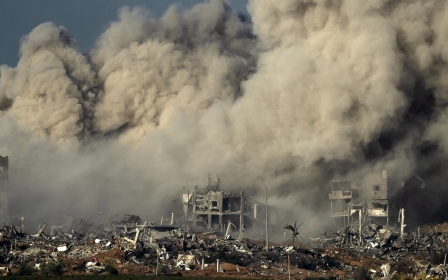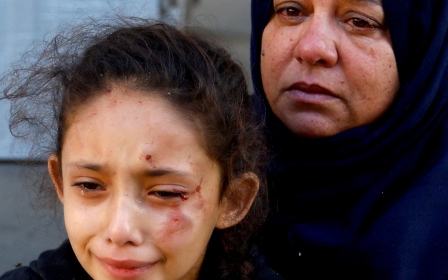Israel-Palestine war: Under occupation, armed resistance will never end
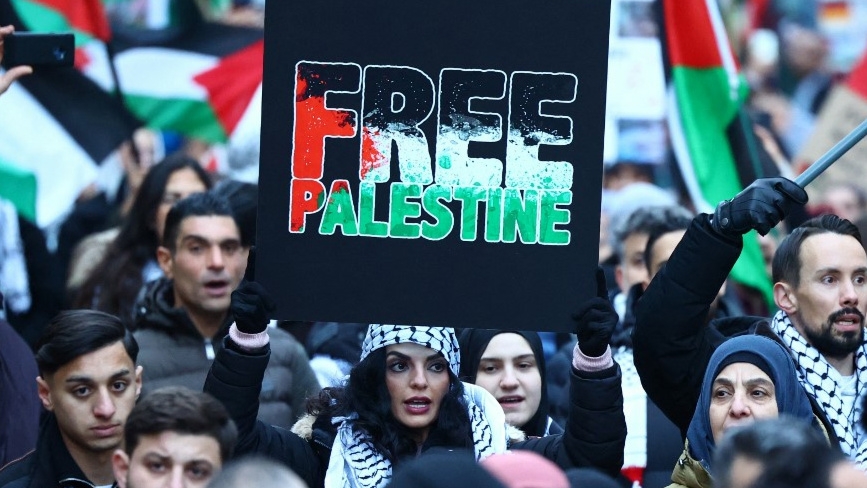
On 7 October, the armed wing of Hamas, al-Qassam Brigades, breached the high-tech, militarised barrier that Israel has used to imprison Palestinians in Gaza for more than 16 years.
The armed group overran Israeli defences, ransacked military bases, and briefly seized control of several settlements. Palestinian fighters killed around 1,200 Israelis, including both soldiers and civilians, and took more than 200 hostages back into Gaza.
In the hours and days that followed, Israel’s western allies and leading media organisations were quick to call the attack “unprovoked”, aiming to justify an Israeli response that has already killed more than 15,000 Palestinians across Gaza and the occupied West Bank.
The 7 October attack was indeed unprecedented, but to call it “unprovoked” reflects a deliberate attempt to obscure the fact that Israel created the violent conditions that rendered a violent response inevitable.
Today, nearly two months into the Gaza massacre, Israeli forces are killing and maiming yet another generation of Palestinians - and provoking the next cycle of violence.
History did not begin on 7 October. What took place that day followed more than 75 years of Israeli settler-colonialism, and it was triggered by the unbearable conditions in Gaza amid Israel’s 16-year siege and imprisonment of more than two million people in the territory.
Most of Gaza’s residents are the descendants of refugees who were forced to flee their homes across Palestine in 1948 in the face of rampaging Zionist militias. Gaza came under Egyptian control until 1967, when Israel invaded and seized the territory.
The grip of Israeli occupation tightened with each year that followed, isolating Gaza’s inhabitants from the rest of Palestine and the world. In the face of relentless Palestinian resistance, Israel withdrew from Gaza in 2005, only to impose a suffocating siege that has continued ever since.
Occupation transformed
The truth is, Israel’s occupation of Gaza never ended; it merely transformed. Today, Gaza is often described as the world’s largest open-air prison. But even this description fails to do justice to the extent of Israel’s brutality.
What Israel is doing in Gaza is far worse: it is a project solely dedicated to the collective punishment of an entire population that has dared to resist.
Follow Middle East Eye's live coverage for the latest on the Israel-Palestine war
With more than 2.3 million people packed into area of about 365 square kilometres, and enclosed behind a high-security electronic fence and concrete wall, Gaza is one of the most densely populated places on earth.
Israel’s blockade looms over just about every aspect of life for Palestinians in Gaza. The Israeli regime controls who enters and exits the Gaza Strip with an archaic permit system, routinely used as leverage over the entire population.
What happened on 7 October was not a random outburst of violence. It was the response of a brutalised people, conducted in the language their colonisers taught them
Surrounded by Israel and Egypt, most Palestinians in Gaza have never been allowed to leave the enclave. Israel even controls its airspace and territorial waters.
The blockade has devastated Gaza’s economy and prompted what the United Nations has termed “de-development” - a situation in which development is not merely impeded, but actively reversed. This has left nearly half of the population unemployed, with the rate exceeding 70 percent among youth.
For many Palestinians in Gaza, life is a struggle for survival. Between 2007 and 2010, Israeli authorities maintained a calorie count of Palestinians’ nutritional requirements to ensure that they only received the bare minimum of food to avoid starvation.
And in just the first six months of 2023, nearly 400 children in Gaza were denied permits to go to the occupied West Bank for urgent healthcare.
Military onslaughts
As if the blockade wasn’t enough, Israel carried out protracted military onslaughts against Gaza in 2008-09, 2012, 2014 and 2021, killing thousands of people and exacerbating already dire living conditions by crippling the territory’s infrastructure.
Homes, schools and hospitals have been destroyed, while attempts to rebuild have been hampered by Israel’s refusal to allow construction materials, such as steel and cement, into Gaza. In 2014, Israel targeted Gaza’s sole power plant, aggravating an energy crisis that persists to this day, with an average of only 13 hours of electricity a day.
While the physical carnage caused by Israel’s brutal assaults has been extensively documented, far less attention has been given to the human toll and the psychological devastation wrought upon an entire generation. An 18-year-old in Gaza is now living through their fifth major Israeli assault. They have seen friends and family massacred by Israeli missiles, artillery shells and sniper rounds.
Meanwhile, nine out of 10 children in Gaza suffer from debilitating conflict-related trauma. With children accounting for around half of Gaza’s population, the future for many is bleak.
The torture of Gaza, however, is only part of the story. The immediate trigger for the recent uptick in Palestinian armed violence was the deteriorating situation across the occupied West Bank, where for years fanatical Israeli settlers have been intensifying their efforts to ethnically cleanse Palestinians from their ancestral homes.
Under the direct protection of the Israeli military, and with explicit encouragement from Israel’s far-right leaders, settlers have carried out deadly pogroms in Palestinian towns such as Huwwara. In recent months, entire communities between Ramallah and Jericho have been cleared out by settler violence.
Even before 7 October, 2023 was shaping up to be the deadliest year for Palestinians since the UN started tracking fatalities in 2006. Across historic Palestine, Israel has been tightening its occupation and basking in the glow of impunity.
Hopeless future
Now, by remaining silent as Israel renders Gaza unliveable, the international community is condemning Palestinians to a hopeless future. Those lucky enough to survive Israel’s unprecedented assault have nowhere to go.
Israel’s military has laid waste to much of northern Gaza, destroying half of the buildings and obliterating entire neighbourhoods. Gaza’s already overburdened critical infrastructure has been shattered, and after forcing hundreds of thousands of civilians to flee northern Gaza, Israel is now gearing up to turn its attention to the south.
By allowing Israel to get away with genocide, the international community is complicit in creating a new crisis that will make the pre-7 October status quo pale in comparison.
To call 7 October “unprovoked” ignores both history and the reality that people who have known nothing but the violence of ethnic cleansing, genocide and settler-colonial rule their entire lives would eventually reach a breaking point. The results might be grotesque, as all violence is, but they will never match the scale of the structural oppressive violence that gave birth to the cycle in the first place.
What happened on 7 October was not a random outburst of violence. It was the response of a brutalised people, conducted in the language their colonisers taught them.
This is neither an argument for nor against armed resistance. To Israel and its backers, there is no distinction: Israel’s long history of crushing all forms of Palestinian resistance, both non-violent and armed, is evidence that the issue was never the method, but rather the fact that Palestinians have dared to resist their oppression at all.
For years, the international community has embraced the fallacy that the Palestinian plight could be ignored, swept under the rug.
Despite repeated warnings, the US and much of the international community expected that Palestinians would ultimately roll over and capitulate to their gradual erasure. It is an indictment of the international community as a whole that it took an unprecedented attack on Israel to put Palestine back on the global agenda.
What unfolded on 7 October showed us that the Palestinian question demands an answer. It showed us that Israel must be held accountable for creating the conditions that led to this point - not just because it is our duty to uphold the values that supposedly undergird our international system and moral compass, but because the status quo is unsustainable.
The truth bears repeating: many Palestinians realise that the Israeli regime responds only to the language of violence and force. So long as Palestinians live under a constant state of oppression and provocation, armed resistance will remain inevitable.
The views expressed in this article belong to the authors and do not necessarily reflect the editorial policy of Middle East Eye.
This article is available in French on Middle East Eye French edition.
Middle East Eye propose une couverture et une analyse indépendantes et incomparables du Moyen-Orient, de l’Afrique du Nord et d’autres régions du monde. Pour en savoir plus sur la reprise de ce contenu et les frais qui s’appliquent, veuillez remplir ce formulaire [en anglais]. Pour en savoir plus sur MEE, cliquez ici [en anglais].



